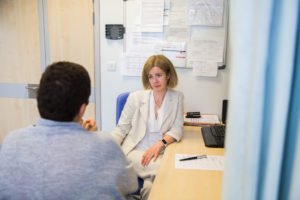Breast Cancer
On this page:

Approximately 55,100 cases of breast cancer are diagnosed every year, usually in women who are over 50 years of age and who have reached the menopause. However, it is possible for women of any age to be affected by breast cancer and, in rare cases, the condition can also affect men.
The breast cancer team is a truly multidisciplinary team and includes specialist surgeons, a medical and clinical oncologist, Advanced Nurse Practitioners, Clinical Nurse Specialists, and are supported by dedicated psychology and palliative care Clinical Nurse Specialists.
St George’s University Hospitals NHS Foundation Trust offers a comprehensive diagnostic service. Advanced Nurse Practitioners have led on the development of Breast Diagnostic services and also that of virtual clinics. Advanced Nurse Practitioners are involved in every stage of the patient pathway. The Breast Unit at St George’s University Hospitals NHS Foundation Trust is co-located with the South West London NHS Breast Screening Service.
Do I need any tests to confirm diagnosis?
The diagnostic process is undertaken by a team of consultant breast surgeons, advanced nurse practitioners, a breast diagnostician and surgical trainees. In addition to the traditional full consultation with an experienced diagnostician, this one-stop model of care provides the following on-the-day services to patients where appropriate:
- FNA (fine needle biopsy)
- Image guided biopsy
- Clinical biopsy
- Imaging including an ultrasound scan and mammogram
The breast clinic is an outpatient clinic where you can see a specialist. You may have all of your investigations at this first visit within the Rose Centre which helps to speed up the process of identifying problems. It can take up to four hours to complete so please allow plenty of time. Some of the results may be available on the same day; others will be available the following week.
What treatment are available?
Breast cancers are usually treated with either surgery, chemotherapy or radiotherapy (or a combination of treatments). Sometimes the radiotherapy is combined with chemotherapy or hormone therapy. The type of surgery needed and the particular combination of surgery and therapy will depend on the type and complexity of cancer.
The breast cancer service available at St George’s University Hospitals NHS Foundation Trust provides the full range of oncoplastic surgical procedures for both benign and malignant breast disorders. This ranges from simple excisions right up to immediate and delayed breast reconstructions.
There is also a well-established dual dye and radioisotope Sentinel Lymph Node biopsy service facilitated by a large Nuclear Medicine Department.
What is Personalised Cancer Care?
Personalised Cancer Care means your team will support you to take an active role in your cancer care by giving choices and control based on what matters most.
Together with your key workers’ team, like your Clinical Nurse Specialist and Macmillan Support worker, we will aim to help you access the care and support that meets your individual needs from the moment you receive your cancer diagnosis so that you can live as full, healthy and active a life as possible.
You will be invited to complete a Holistic Needs Assessment (HNA) to identify any concerns you may have when you have been diagnosed with cancer. These concerns may be physical, emotional, practical, financial and spiritual.
You will answer a simple set of questions or fill in a checklist about all areas of your life. It is to find out about the concerns you may have. You are often asked to rate how important these concerns are to you. It could help you decide what to discuss first during the assessment.
Once you have completed the assessment, your Clinical Nurse Specialist will discuss your needs, maybe face-to-face in a clinic or over the phone. During the discussion, you and your Clinical Nurse Specialist will agree on the best ways to manage your needs and concerns. They will write down what you have decided in a document called a care plan. They may write it during the discussion. Or they may make notes and send them to you afterwards. Your care plan will record the following:
- The main concerns you talked about
- Suggestions and actions to help you manage your concerns
- Services that may be able to support you, and any referrals that are made
- What is already being done to help – for example, the services you are already using
- Information about who to contact if you need more help
- The details of other health or social care professionals with whom you have agreed to share the information.
You may not wish to complete the holistic needs assessment at this time. The care you receive will not be affected in any way, and we will be happy to discuss this again in the future
Health and wellbeing information and support also include:
- Access to the Macmillan Information & Support Centre to find out what support is available in the community, e.g., practical, financial, and how to access it
- Help with understanding cancer and its treatment and how to manage its impact through videos and workshops run by healthcare professionals at St George’s and in the community.
- Attend wellbeing activities which are great opportunities for you and your carers to get together with others affected by cancer.

